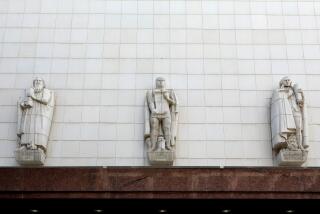Charles Loring; County Judge Aided Reforms
- Share via
Charles A. Loring, who as presiding judge of the vast Los Angeles County Superior Court helped create California’s compulsory arbitration system, has died at the age of 78.
Loring, a native of San Bernardino who attended the University of Redlands and Hastings College of Law, died Sept. 6 in Calabasas.
The jurist handled cases for the local trial court from 1959 until his retirement in 1980. He served two years as assistant presiding judge and two years as presiding judge, guiding a package of 39 judicial reform recommendations through the Legislature.
Loring chaired a special committee of the California Judicial Council to study and push one of those recommendations--compulsory arbitration--which became state law. Under that system, a trial judge sends a case to compulsory arbitration, avoiding a more costly trial, if he finds that the probable award will be less than $25,000. Although an arbitrator’s decision can be appealed for a trial, fewer than 10% of litigants have sought that option.
In 1972, Loring was chosen Trial Judge of the Year by the Los Angeles Trial Lawyers Assn.
In his later years as a Superior Court judge, he was frequently assigned to sit on the state Court of Appeal in Los Angeles and in Fresno. During those special assignments, he wrote 300 opinions, only two of which were overturned by the state Supreme Court.
Then-Chief Justice Donald R. Wright praised Loring’s “well-reasoned and scholarly opinions on every phase of the law” and noted: “His contribution to the work of the judiciary in California has been outstanding and we are all in his debt.”
After Loring’s retirement he served six years as consultant to the statewide committee that standardizes jury instructions for use by California judges.
Loring served in the Pacific during World War II, advancing from private to first lieutenant and earning the Purple Heart and Bronze Star. He also trained as a counterintelligence agent.
Loring served as president of his Redlands and Hastings alumni associations and was a member of Redlands’ board of trustees. He received Redlands’ Alumni Distinguished Service Award and its honorary doctor of laws degree.
He is survived by his wife, Ruth, and five children.
More to Read
Sign up for Essential California
The most important California stories and recommendations in your inbox every morning.
You may occasionally receive promotional content from the Los Angeles Times.













